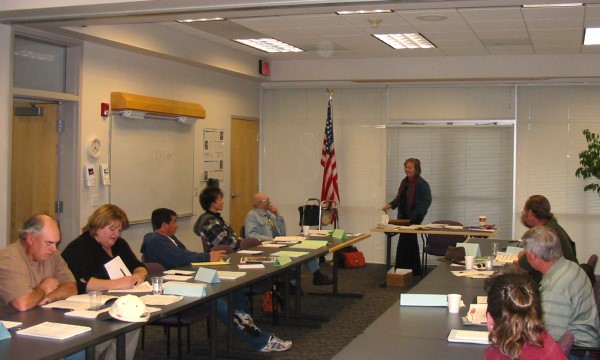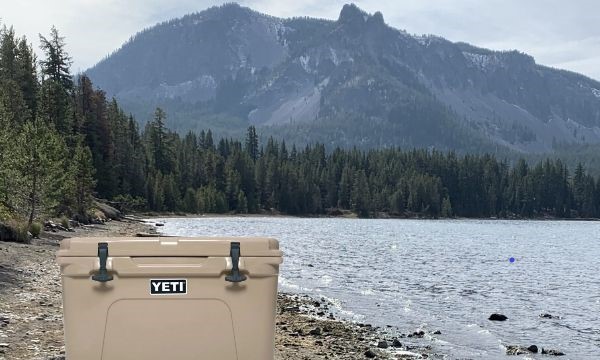The Bottom Line
Small business is important to Central Oregon, and to Mid Oregon. Find tips and resources for business, and information about Mid Oregon’s commercial services and business members.

Get Financially Educated This Spring
Mid Oregon Credit Union has long emphasized financial education. For many years we have presented workshops on a variety of financial topics free to our members AND to the anyone in Central Oregon. Our Spring workshop schedule is out, and we would like to invite you to attend. Join us to get financially educated this Spring. We hope to see you at one or more of our workshops!
All workshops are free, and will be presented at our East Bend upstairs conference room, at 1386 NE Cushing Avenue.
Workshop Schedule
March 31 Free Workshop: Estate Planning Essentials—6 pm, East Bend Conference Room. Presenter Jeff Patterson of Schwabe, Williamson and Wyatt will cover wills, trusts, powers of attorney, healthcare documents, and beneficiary designation assets/accounts. Free to all members of the community. A light dinner will be offered. RSVP: www.midoregon.com, info@midoregon.com or 541-382-1795.
April 2 No-Cost Workshop: How to Weather A Bear Market— 6 pm, East Bend Conference Room. (See the information below for more details)
April 9 Free Workshop: Understanding the ABCs (and Ds) of Medicare, 6 pm, East Bend Conference Room. Presenter Emily Carrick, of PacificSource Medicare, outlines the differences between Medicare Part A, Part B, Part C, and Part D. You’ll also learn more about who is eligible for Medicare, what is covered, what is not covered, and the enrollment timelines. Free to the community. A light dinner will be offered. Offered for educational purposes only; not a sales presentation. RSVP: www.midoregon.com, info@midoregon.com or 541-382-1795.
Attend A Seminar on Bear Markets
When the market dips, what do you do? How do you react? Without a plan, reacting based on your instincts could hurt your long-term financial goals. Learn steps you can take now to prepare to weather the next bear market. Join us for an educational seminar on “How to Weather a Bear Market” to be held on April 2 at 6 pm at Mid Oregon’s East Bend Conference Room Learn answers to important questions, like:
• What is a bear market?
• How does behavioral finance affect decision-making?
• How do overreaction and bad decisions compromise long-term financial goals?
• How do I weather a bear market?
Hosted by Mid Oregon Wealth Management
This no-cost, no-obligation seminar is hosted by JC Hallman, the Mid Oregon Wealth Management representative at Mid Oregon Credit Union. A light dinner will be offered.
For more information or to reserve your place, call 541-322-5745 or email j.c.hallman@cunamutual.com. Space is limited, so make your reservations today.
Some products discussed in this seminar are annuities and are sold by prospectus. Annuities are long-term insurance products designed for retirement purposes. Many variable annuities offer four main features: (1) a selection of investment options, (2) tax-deferred earnings accumulation, (3) guaranteed lifetime payout options, and (4) death benefit options. Before investing, you should consider the annuity’s investment objectives, risks, charges and expenses. The prospectus contains this and other information. Please read it carefully. To obtain a prospectus, contact your advisor, log onto membersproducts.com, or call 888.888.3940.
This workshop is educational only and is not investment advice. If you need advice regarding your financial goals and investment needs, contact a financial advisor. MEMBERS Insurance & Investments and MEMBERS are marketing name for the products, services and programs offered by CMFG Life Insurance Company (CMFG Life) and MEMBERS Life Insurance Company (MEMBERS Life) and other leading carriers. MEMBERS® is a registered trademark of CMFG Life. CUNA Mutual Group is the marketing name for CUNA Mutual Holding Company, a mutual insurance holding company, its subsidiaries and affiliates. Investment and insurance products are not federally insured, may involve investment risk, may lose value and are not obligations of or guaranteed by any depository or lending institution. MGA-2079753.1-0418-0520

Treat Yourself To a Stress-Free Tax Season
Treat Yourself To Your Maximum Refund …And a Chance to Win $25K!
It’s time! The IRS started processing tax returns on 1/27. File today with TurboTax to be first in line for your refund. Mid Oregon Federal Credit Union has teamed with TurboTax to save you up to $15 on TurboTax and a chance to win $25,000. Treat yourself to a stress-free tax season.
- Right for your unique tax situation. Simple filer? Homeowner? Investor? Freelancer or side-gigger? TurboTax has a solution for you.
- File with confidence. TurboTax guarantees 100% accurate calculations and runs thousands of error checks as you go. With TurboTax, you’ll get your biggest possible refund.
- Help if you need it. It’s easy to get support along the way — from answers online anytime, to unlimited advice and a final review of your return from a TurboTax Live CPA. Answers that will help with that stress-free tax season.
- $25,000 Sweepstakes. Try TurboTax Online for free by February 13th to be automatically entered to win the $25K Grand Prize, or one of 12 $1,000 prizes.
Save on TurboTax today! Try it for free and pay only when you’re ready to file.
TurboTax Details
Visit turbotax.intuit.com/lp/yoy/guarantees.jsp for TurboTax product guarantees and other important information. Limited time offer for TurboTax 2019. Discount applies to TurboTax federal products only. Terms, conditions, features, availability, pricing, fees, service and support options subject to change without notice. Intuit, TurboTax and TurboTax Online, among others, are registered trademarks and/or service marks of Intuit Inc. in the United States and other countries.
Sweepstakes Details
TurboTax $25,000 Sweepstakes. NO PURCHASE OR FINANCIAL DISCLOSURE NECESSARY. Open to legal residents of the 50 United States or the District of Columbia, 18 years of age or older at time of entry, who are customers of participating Financial Institutions or employees of participating businesses. Void in Puerto Rico and where prohibited by law. Sweepstakes ends 2/13/20. Subject to complete Official Rules and all applicable federal, state and local laws. For Official rules including participating Financial Institutions and businesses, odds of winning, alternate method of entry, and prize descriptions, visit the Official Rules.
PRIZES: 1 Grand Prize: A check for $25,000. Retail value, $25,000. 12 First Prizes: A check for $1,000. Retail value, $1,000 each. Maximum retail value of all prizes is $37,000. The odds of winning a prize depend upon the total number of eligible entries received by the end of the Promotion Period. SPONSOR: Intuit Inc., 7535 Torrey Santa Fe Rd, SDG-1A-04-05B, San Diego, CA, 92129.

Tell-A-Friend, Earn A Reward
Plus, be entered to win a Yeti® Tundra 45 cooler, valued at $299!
We love rewarding our members when they spread the word about our great checking accounts—that’s why we introduced our Tell-A-Friend program. When your friend opens a Mid Oregon checking account, you’ll both get a reward! We’ll buy back their old debit cards and checks for up to $10, and enter them to win a prize! (Prize through February 23, a 50″ Magnavox 1080p HDTV). Tell-A-Friend, earn a reward.
What do you get when you refer someone? A $10 gift card! And there is no limit, so you can keep referring. As long as the person you refer provides us with your name and email address, your award will be automatic.
Ways To Refer
There are three easy ways to refer your friends:
- First, you can obtain a Mid Oregon Tell-A-Friend referral coupon, complete your information on the back and give it to your friend. We will capture your information when they present the coupon as they open their checking account. Tell-a-Friend Referral Coupon- Best Resolution.
- Second, you can email your friend automatically using our online referral page, https://refer.midoregon.com/. Just visit the page, complete your information, and enter your friend’s name, email address, and a brief personal message before you send. When your friend opens their checking account, our new account representative will see you sent them an email, and complete the process.
- And now you can also share through your own email or social media with a sharable link. Visit the same webpage at https://refer.midoregon.com/. Instead of clicking “Email A Friend”, click “Get Shareable Link”. That will produce your personalized URL you can copy and paste into any number of places. When the friend opens their new checking account, you will be credited with the referral.
Win a Yeti 45 Qt. Cooler!
And now through March 20, 2020, you’ll also be entered into a free drawing for a Yeti® Tundra 45 cooler, valued at $299.
This premium cooler is infused with legendary YETI toughness — a durable rotomolded construction and up to two inches of PermaFrost™ Insulation. It’s 25 3/4″ wide, 15 2/8″ high and 16 1/8″ deep. With an empty weight of 23 lbs., plenty of your favorite drinks, and keep them cold for a long, long time.
Just visit refer.midoregon.com to start referring. There’s no limit—you can refer as many friends as you like (and earn as many gift cards as you want). You don’t even need to have a Mid Oregon checking account to Tell-A-Friend and be entered to win. Although why would you miss out on all the savings and convenience by having your checking account anywhere else?
Yeti Drawing Rules: No purchase necessary to enter or win a prize. Must be 18 years of age or older. Entries accepted through March 20, 2020. No cash equivalent, substitution or transfer of prize permitted. One entry per person. Other restrictions apply. See a Mid Oregon associate for details.
